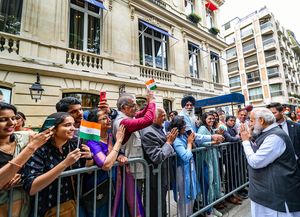Soft power has never been more powerful. In an increasingly interconnected world, where borders are porous and technology has facilitated the seamless, real-time dissemination of vast amounts of information, influence is no longer geographically bound. In fact, at the most micro level, hundreds of individuals have made entire careers out of it.
On the global stage, the potency of soft power holds the ability to sway the perceptions of communities—strengthening cross-cultural understanding, shaping aspirations. The resurgence of the Global South, in recent years, underscored the impact of convening power in nations. As emerging economies assert their influence and challenge traditional power structures, the ability to shape narratives and cultivate positive perceptions becomes increasingly vital.
The ascendancy of soft power heralds a paradigm shift in the dynamics of international relations, and India’s rise as a global superpower serves as a perfect case-study of the benefits of institutionalising influence. The 2014 general election marked a pivotal moment for Indian foreign policy, with Prime Minister Narendra Modi ushering in a new era defined by the strategic use of soft power on both regional and global fronts. Through the adoption of digitally savvy communication strategies, the consistent engagement of the Indian diaspora, and the formal and active commemoration of India’s diverse culture, the Modi government has made significant strides to convert an ad-hoc approach to intentional, state-driven cultural dispersion.
Our startup ecosystem is flourishing, propelling India to the forefront of global innovation. As of October 3, 2023, India has emerged as the third largest ecosystem for startups worldwide, boasting over 1,12,718 startups recognised by the department for promotion of industry and internal trade, spread across 763 districts. Increasingly, homegrown startups in emerging technologies and sunrise sectors like blockchain, AI, fintech, space tourism, green energy, and semiconductors will play a key role in our ability to push for favourable global policies and regulations around new technology and data.
As the former tourism secretary of Kerala, I witnessed first-hand the potential of cultural diplomacy in elevating the state from obscurity to acclaim on the global tourism map. Through a combination of innovative marketing strategies and public-private partnerships, we rebranded Kerala as 'God's Own Country’, showcasing its rich traditions of art, cuisine, and natural beauty to audiences worldwide. From highlighting Kathakali and Kalaripayattu to reinventing Ayurveda as a holistic wellness regimen, we knew that the region’s cultural heritage was an untapped resource that could change its perception, create jobs, boost the local economy, catalyse infrastructure development, instil civic pride, and lead to the conservation of its natural ecosystems.
2023 was declared the International Year of Millets by the UN at the behest of Modi. This allowed India to share the benefits of the highly nutritious and climate-smart superfood with the world, both through substantive discussions during negotiations on sustainable agricultural solutions, and by integrating it in every official menu so that foreign delegates could experience its benefits first-hand. Soft power, embodied through the influence wielded by Modi in diplomatic circles, resulted in the fostering of international cooperation towards shared environmental and food-security goals.
As we navigate the complexities of the 21st century geopolitical landscape, the imperative of harnessing both hard and soft power becomes increasingly apparent. In the case of India, the integration of these two spheres is particularly crucial given its diverse cultural heritage, economic prowess, and strategic significance in the global arena. As a nation with a rich history and a rapidly growing economy, India's soft power assets, including its cultural exports, diaspora influence, and diplomatic outreach, play a pivotal role in shaping its global image and fostering international cooperation. However, to safeguard its interests and defend against potential threats, India also relies on a robust defence apparatus and strategic alliances, demonstrating the necessity of hard power capabilities. By harmonising its soft power initiatives with a strong military presence and strategic partnerships, India can effectively navigate geopolitical challenges while leveraging its cultural and economic strengths to promote peace, stability, and prosperity on the world stage.
Author is G20 Sherpa. He is ex-CEO, NITI Aayog.


